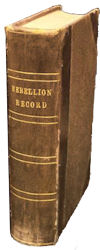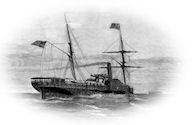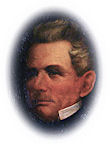.
NEW YORK, January 4, 1861.
Lieut. Gen. WINFIELD SCOTT,
Washington, D. C.:
DEAR GENERAL: I had an interview with Mr. Schultz at 8 o’clock last evening, and found him to be, as you supposed, the commission, and together we visited Mr. M O. Roberts. The latter looks exclusively to the dollars, whilst Mr. S. is acting for the good of his country. Mr. R. required $1,500 per day for ten days, besides the cost of 300 tons of coal, which I declined; but, after a long conversation, I became satisfied that the movement could be made with his vessel, the Star of the West, without exciting suspicion. I finally chartered her at $1,250 per day. She is running on the New Orleans route, and will clear for that port; but no notice will be put in the papers, and persons seeing the ship moving from the dock will suppose she is on her regular trip. Major Eaton, commissary of subsistence, fully enters into my views. He will see Mr. Roberts, hand him a list of the supplies with the places where they may be procured, and the purchases will be made on the ship’s account. In this way no public machinery will be used.
To-night I pass over to Governor’s Island to do what is necessary, i.e., have 300 stand of arms and ammunition on the wharf, and 200 men ready to march on board Mr. Schultz’s steam-tugs about nightfall to-morrow, to go to the steamer, passing very slowly down the bay. I shall cut off all communication between the island and the cities until Tuesday morning, when I expect the steamer will be safely moored at Fort Sumter.
I have seen and conversed with Colonel Scott, and also saw your daughter at your house. After leaving you, I obtained the key of the outer door of the office, but could nowhere find the key of your door or of mine, so failed to get the chart. This is of little moment, as the captain of the steamer is perfectly familiar with the entrance of Charleston.
I telegraphed you this morning, as follows:
Arrangements made as proposed; to leave to-morrow evening; send map.
I will now leave the office, where I am writing, to proceed to the island.
Very sincerely, General, your obedient servant,
L. THOMAS,
Assistant Adjutant-General.

_____
HEADQUARTERS OF THE ARMY,
New York, January 5, 1861.
Maj. T. H. HOLMES,
Eighth Infantry,
Superintendent Recruiting Service, Fort Columbus:
SIR: By direction of the General-in-Chief, you will detach this evening two hundred of the best-instructed men at Fort Columbus, by the steamship Star of the West, to re-enforce the garrison at Fort Sumter, South Carolina.
They will be furnished with arms, and, if possible, one hundred rounds of ammunition per man. Orders will be given to the proper officers of the staff department to furnish one hundred stand of spare arms and subsistence for three months.
The officers assigned to duty with the detachment are Lieuts. C. R. Woods, Ninth Infantry; W. A. Webb, Fifth Infantry; C. W. Thomas, First Infantry, and Asst. Surg. P. G. S. Ten Broeck, Medical Department, all of whom will report for duty to Major Anderson, commanding Fort Sumter.
Yours,
L. THOMAS.

_____
HEADQUARTERS, January 5, 1861.
First Lieut. CHARLES R. WOODS,
Ninth Infantry, Fort Columbus:
SIR: The steamship Star of the West has been chartered to take two hundred recruits from Fort Columbus to Fort Sumter, South Carolina, to re-enforce the garrison at that post. You are placed in command of the detachment, assisted by Lieuts. W. A. Webb, Fifth Infantry; C. W. Thomas, First Infantry, and Asst. Surg. P. G. S. Ten Broeck, Medical Department. Arms and ammunition for your men will be placed on the steamer and three months’ supply of subsistence.
The duty upon which you are now placed by direction of the General-in-Chief will require great care and energy on your part to execute it successfully, for it is important that all your movements be kept as secret as possible. Accordingly, on approaching the Charleston bar, you will place below decks your entire force, in order that only the ordinary crew may be seen by persons from the shore or on boarding the vessel. Every precaution must be resorted to to prevent being fired upon by batteries erected on either Sullivan’s or James Island.
Yours,
L. THOMAS.

_____
HEADQUARTERS OF THE ARMY, New York,
January 5, 1861.
Maj. ROBERT ANDERSON,
First Artillery, Commanding Fort Sumter :
SIR: In accordance with the Instructions of the General-in-Chief, I yesterday chartered the steamship Star of the West to re-enforce your small garrison with two hundred well-instructed recruits from Fort Columbus, under First Lieut. C. R. Woods, Ninth Infantry, assisted by Lieuts. W. A. Webb, Fifth Infantry; C. W. Thomas, First Infantry, and Asst. Surg. P. G. S. Ten Broeck, Medical Department, all of whom you will retain until further orders. Besides arms for the men, one hundred spare arms and all the cartridges in the arsenal on Governor’s Island will be sent; likewise, three months’ subsistence for the detachment and six months’ desiccated and fresh vegetables, with three or four days’ fresh beef for your entire force. Further re-enforcements will be sent if necessary.
Should a fire, likely to prove injurious, be opened upon any vessel bringing re-enforcements or supplies, or upon tow-boats within the reach of your guns, they may be employed to silence such fire; and you may act in like manner in case a fire is opened upon Fort Sumter itself.
The General-in-Chief desires me to communicate the fact that your conduct meets with the emphatic approbation of the highest in authority.
You are warned to be upon your guard against all telegrams, as false ones may be attempted to be passed upon you. Measures will soon be taken to enable you to correspond with the Government by sea and Wilmington, N. C.
You will send to Fort Columbus by the return of the steamer all your sick, otherwise inefficient officers and enlisted men. Fill up the two companies with the recruits now sent, and muster the residue as a detachment.
I am, sir, very respectfully, your obedient servant,
L. THOMAS,
Assistant Adjutant-General.










